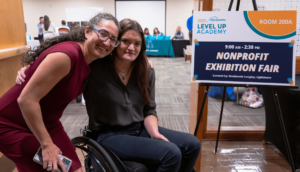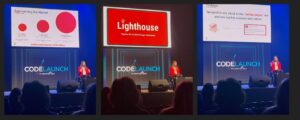Mackenzie Langley, founder of Lighthouse, spearheads a mission-driven endeavor revolutionizing the nonprofit landscape. Lighthouse serves as a collaborative social network empowering nonprofit leaders to forge strategic partnerships and leverage untapped resources, enriching impact and efficiency. Inspired by personal challenges post-accident and driven by a vision to bridge gaps in the nonprofit sector, Mackenzie reimagined connectivity, aiming to propel nonprofits toward transformative change.
The mission of Lighthouse is to eliminate the disconnect between available resources and those in need. Mackenzie’s journey, ignited by personal struggles in accessing nonprofit support, highlighted the sector’s archaic connectivity, prompting a quest for innovative change. Recognizing inefficiencies in resource allocation and organizational practices, Mackenzie envisioned Lighthouse as a technological solution, empowering nonprofits to unlock their full potential and create sustainable solutions for their communities.
Mackenzie Langley, founder of Lighthouse, shares transformative insights and visionary perspectives in this interview with FYC, offering a compelling narrative of innovation in the nonprofit sector.

What is the mission and purpose of Lighthouse?
Lighthouse is revolutionizing the nonprofit sector by building a collaborative social network that makes it easy for nonprofit leaders to develop strategic partnerships and share resources to enhance their impact and efficiency. At Lighthouse, we believe that there is no reason available resources should be left unused solely because people in need are unable to access them. By making it easy for nonprofit leaders, who already possess the skills to build sustainable solutions, with the necessary tools to address the challenges in their communities we are ensuring that public need and public good can always find each other at the intersection of opportunity.
What inspired the creation of Lighthouse, and how did the idea for this organization come about?
At 16 years old I was a passenger in a car accident that left me paralyzed. In a moment, I went from a healthy and active teenager to needing help and support in a way I could have never imagined. After my accident, I needed specific support, and finding nonprofits online was challenging.
What I would come to realize is that the nonprofit sector is stuck in the “Yellow Pages” era. It remains hard to connect online. As a result, whether you are looking for help or are eager to connect with new opportunities to give back through volunteering and donating, Google is entirely unhelpful.
My early career in the nonprofit space also taught me that organizations don’t always work as efficiently as they could be. The outdated practices for allocating resources often result in organizations not having as great an impact as they could be.
Living in the technological revolution we are in, I realized that this problem doesn’t need to persist. By revolutionizing this sector we are setting up nonprofits and the communities they serve for success against the challenges that they face.

In what ways do you see technology, particularly AI, playing a role in shaping the future of social impact and charitable initiatives, based on your experience with Lighthouse?
The nonprofit and social impact space is notably technologically delayed. There are so many opportunities to use innovative technology tools, such as AI, to increase the impact and efficiency of the sector. At Lighthouse we want to be intentional about any implementation of tech we include in our products. We want to ensure we are not simply adding tech because it is “buzzworthy”. We want it to truly add value to the community we are fostering. I am excited to share that in collaboration with FYC Labs we identified a truly valuable opportunity to add AI components to the platform that are in line with our vision and values. More on this to come!
Community engagement is crucial for platforms like Lighthouse. How do you plan to foster and grow the community around your platform in the long term?
At Lighthouse, the community is at the center of everything we do. We are intentional about building Lighthouse alongside our nonprofit partners rather than for them, fostering a community that nonprofit leaders take ownership and pride in.
We’ve implemented strategic approaches to ensure a collaborative community:
- Launching by location- we hyperfocus on the unique needs of every community, building meaningful connections and opportunities for joining nonprofits.
- Being reachable- nonprofits can share their experiences with us on Lighthouse and in their day-to-day work. This strengthens our understanding and community bonds.
- Meetups- developing Lighthouse to encourage both on-screen and off-screen connections. In-person opportunities facilitate relationship-building, a key factor in the nonprofit space, and provide educational value.
In the long term, our intentional foundation is set to support nonprofits in fostering a thriving community as we scale. It’s not just about growth; it’s about building a sustainable and impactful collaborative environment.
Lighthouse aims to connect people with nonprofits. Can you share a success story or a memorable instance where your platform facilitated a meaningful connection between a user and a nonprofit organization?
At Lighthouse, our vision is to create a vibrant marketplace connecting nonprofits and individuals. We want to ensure that no available resources go unused. One impactful example showcases the power of collaboration within our community.
Decade2Connect, a nonprofit on Lighthouse, found themselves with 23 surplus bed frames following a transition from residential to outpatient care post-COVID. Uncertain about the next steps, they reached out for assistance. Through Lighthouse, we orchestrated the transfer of these bed frames to CASA, another nonprofit furnishing homes for those aging out of foster care.
This story vividly illustrates the tangible benefits of uniting nonprofits. Decade2Connect saved resources previously allocated to storage. Then CASA could redirect time and effort from grant applications for funding the furniture to focusing their efforts on serving their community.
This success story mirrors numerous instances on our platform, from clothing and hygiene products to baby formula and worker safety gear. It exemplifies our core belief: when nonprofits collaborate, the community does better.

What challenges has Lighthouse faced, and how have you overcome them?
At Lighthouse, navigating challenges is inherent to our journey as an early-stage startup. Our commitment to solving a crucial problem in the nonprofit space has fueled our resilience in overcoming obstacles. Passion is our driving force, propelling us to delve deep into the intricacies of the nonprofit sector. It also makes us remain open to refining our solution to better align with their evolving needs. This dedication has not only shaped our adaptive approach. It has also fortified our resolve to create meaningful impact through innovative solutions.
What’s next for Lighthouse?
To say I am so excited about what’s next for Lighthouse would be an understatement. First thing on the agenda is finishing up the build-out for Lighthouse 2.0. Then getting into the market in Denver. We are eager to fine-tune the product as needed. This way we can establish product market fit and set our sights on the second launch location. After such an incredible response from CodeLaunch and the DFW, we may very well find ourselves there next!
Right now, we’re putting the final functionality features on Lighthouse 2.0 and gearing up for its launch in Denver. After so much incredible feedback from the local nonprofits there, we are excited to get it out there and into the hands of the nonprofits. We’re confident that this product is tuned to their needs. After the buzz at CodeLaunch and the warm welcome in DFW, who knows? The next geographic stop might be closer than we think
How can people support your mission?
Even as we are gearing up to launch in Denver, we’re excited to connect with like-minded individuals and organizations everywhere, regardless of where you are. If you’re passionate about our mission and are outside Denver, join our waitlist at lhsocial.co/waitlist. Your input guides us on where to launch next and ensures we’re building something meaningful together, one community at a time.

Connect with Mackenzie and Lighthouse on LinkedIn!
Check out our nonprofit page!